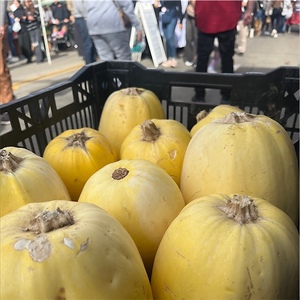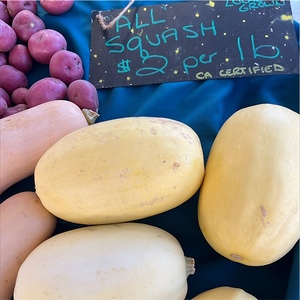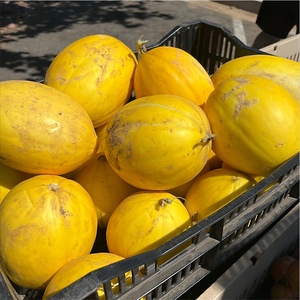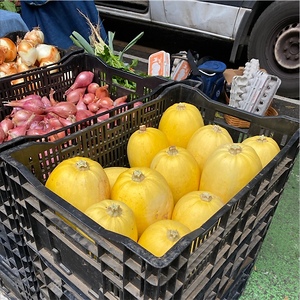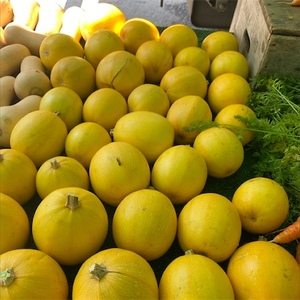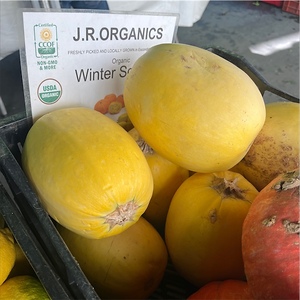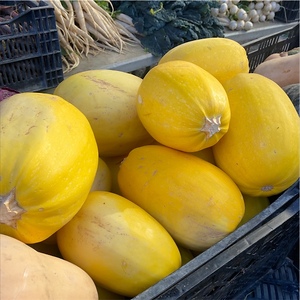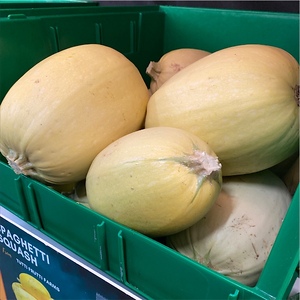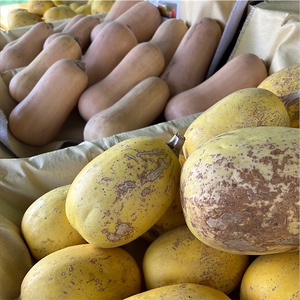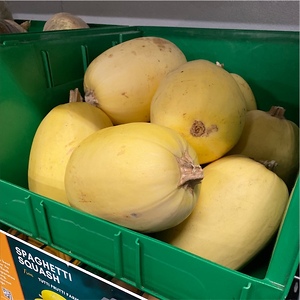


Spaghetti Squash
Estimated Inventory, 35 lbs : 4.78
This item was last sold on : 01/21/25
Description/Taste
Spaghetti squash is a small to medium-sized vegetable that typically measures 15 to 30 centimeters long and weighs around 1 to 3.5 kilograms each. It has an oblong and cylindrical shape similar to a melon. The vegetable is connected to a small light brown stem with a rough texture. Its rind is firm, smooth, and transforms from green to a vibrant canary yellow, pale yellow, or yellow-green hue when mature. Some varieties may possess orange or green mottled stripes on their rinds. Spaghetti squash flesh is thick, dense, moist, and pale-yellow. It houses a large central cavity filled with stringy pulp and flat cream-colored seeds. Spaghetti squash is best known for its unique flesh that separates into long, translucent strings that resemble angel hair pasta. When cooked, the squash has a tender texture with a slight crunch and a mild, slightly nutty flavor.
Seasons/Availability
Spaghetti squash is available year-round with a peak season from late summer to mid-fall.
Current Facts
Spaghetti squash is botanically classified as Cucurbita pepo and belongs to the Cucurbitaceae family along with pumpkins, cucumbers, and gourds. It is a type of winter squash that’s frequently called Vegetable Spaghetti, Noodle squash, Mandarin squash, and Vegetable Marrow. Spaghetti squash is technically a fruit but is commonly cooked like and referred to as a vegetable. It's favored for its unusual noodle-like texture that can be attributed to the presence of a recessive gene. This vegetable comes in many different varieties including Primavera, Tivoli, Stripetti, Vermicelli, Angel Hair, and Millionaire Spaghetti squash. Its plants make for attractive ornamentals with large funnel-shaped flowers in vibrant shades of yellow. Spaghetti squash is used in a variety of culinary applications as a healthy low-carb option.
Nutritional Value
Spaghetti squash is rich in vitamin C to help support the immune system, promote healthy skin, and protect against oxidative stress. This vegetable also contains vitamin B6, a nutrient that plays a crucial role in brain function and aids in metabolism, eye and heart health, red blood cell production, and inflammation reduction. The fiber content in Spaghetti squash supports digestion, gut health, and healthy cholesterol levels. The manganese found in this vegetable is important for bone health, wound healing, and metabolizing nutrients. Spaghetti squash also provides niacin that's essential for converting food into energy, supporting skin health, and maintaining a healthy nervous system.
Applications
Spaghetti squash is best suited for cooked applications such as roasting, steaming, and baking. It can be cooked whole or sliced in half for faster preparation. Spaghetti squash has a mild enough taste that it will absorb any accompanying flavors. It's often shredded with a fork to create a noodle-like texture that can be incorporated into various pasta recipes with ingredients like marinara sauce, Italian sausage, ricotta cheese, asparagus, pine nuts, or pesto. Spaghetti squash is often halved and stuffed with mushrooms, goat cheese, bread crumbs, onions, olives, and ground beef. It can also be mixed into casseroles, gratins, and bakes. Spaghetti squash pairs well with fresh herbs such as thyme, basil, oregano, parsley, and mint. It’s complemented by ingredients like zucchini, bell peppers, snap peas, soy and fish sauce, tamari, parmesan, mozzarella, feta cheese, shrimp, chicken, and pancetta. It will keep for 3 to 6 months when stored whole in a cool and dry place. Once cut, Spaghetti squash should be wrapped in plastic and refrigerated for up to two days.
Ethnic/Cultural Info
In the northeastern Chinese region of Manchuria, Spaghetti squash was known as yúchì guā and translated to shark-fin gourd. This name referred to the squash's stringy flesh which resembled finely shredded shark fin when used in soups. Spaghetti squash was commonly chosen as an alternative to these fins because it was much more affordable and abundant. One plant was able to produce up to about 14 kilograms of squash each season. The squash could be stored for months and was valued in rural Manchurian communities where cold winters required sustainable food preservation methods. Farmers would cut spirals of Spaghetti squash using rasps and rods on a sawhorse. They hung up the flesh and left it to dry in the sunshine to dehydrate naturally. The Spaghetti squash was then eaten in its sun-dried form or tossed into soups and stir-fries.
Geography/History
Spaghetti squash was first recorded in Manchuria, China in 1850. It grows best in warm climates with high sun exposure and fertile soils. Spaghetti squash has been bred over generations to grow well in both commercial farms and home gardens. This vegetable was first introduced from China to Japan in 1921 by the Aichi Prefectural Agricultural Research Station. In 1934, the Sakata Seed Company in Japan developed an improved variety that was the first to market the Spaghetti squash under the name Somen Nankin commercially. W. Atlee Burpee and Co. then brought the squash to North America in 1936 and sold its seeds in their catalog under the name Vegetable Spaghetti. Spaghetti squash was not immediately popular but started to gain traction during World War II when it was used as a substitute for pasta at a time when processed foods were harder to obtain. Today Spaghetti squash is widely available at farmers' markets, grocery stores, and through online seed catalogs in North America, Central America, South Africa, Europe, Asia, and Australia.
Featured Restaurants
Restaurants currently purchasing this product as an ingredient for their menu.
| Pete's Premade Paleo | San Diego CA | 770-359-8274 |
| Pacific Regent La Jolla | San Diego CA | 858-597-8008 |
| Cape Rey Carlsbad, a Hilton Resort | Carlsbad CA | 760-602-0800 |
| Pure Meal Prep SD | San Diego CA | 209-485-4861 |
| Saint Mark Golf and Resort, LLC | San Marcos CA | 508-320-6644 |
| Primal Balance Nutrition LLC | Vista CA | 818-259-0995 |
| Farm Fresh Meals | Vista CA | 760-707-2383 |
Recipe Ideas
Recipes that include Spaghetti Squash. One



